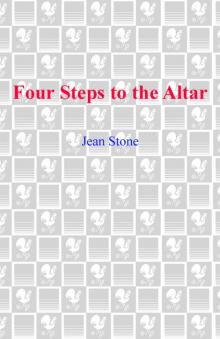- Home
- Jean Stone
Trust Fund Babies Page 9
Trust Fund Babies Read online
Page 9
They entered an office that looked more like a hunt club for its dark green and mahogany, leather, and shiny brass. Mary Beth presumed the decor intentionally recreated familiar surroundings for the old-moneyed guests.
The assistant administrator posed at the hand-carved, rosewood fireplace mantel. “I’m going to come straight to the point, Ms. Atkinson, because that’s how we do things at Harriman House.”
Mary Beth sat on a silk-covered chair.
“We have not received payment for your mother’s care this month,” the woman said. “Or last month,” she added.
Well, of course they had not received payment this month. Mary Beth had not received her trust fund check. And last month? Oh, yes, the wedding expenses had begun accumulating.… She’d meant to make it up out of the new check, the one that had never come. They were plausible reasons that she could not share because it was no one’s business.
She cocked her head. “You haven’t received payment? For two months?”
The woman did not smile. “I’m sure it’s an oversight. But to provide our patients—your mother—with the best possible comfort and care, we have a costly overhead. Perhaps if you speak with your money manager …”
There was no reason to explain that Mary Beth managed her own money and had for the past several years. It was an uncommon practice among people in her “position,” but she’d grown tired of hand-slapping by those in control of her checkbook who could not refrain from chastising her about her daily expenses. As if any of them would know the difference between a two-hundred-dollar haircut and the ones they got for eighteen-plus-tip.
Lester, of course, was bad enough. She could fire her check-writers but not her trust fund manager. Aunt Margaret had ordered it, and even today, her rule prevailed.
“I most definitely will. I cannot imagine what happend.” She furrowed her brow into a show of concern. “I’ve never had problems with the firm.”
“Well, things happen. A new employee, perhaps. Some slipshod bookkeeping …”
“Slipshod! Ha!” Mary Beth tipped back her head and laughed. “At their rates you’d think they’d have more than a slipshod bookkeeper overseeing my finances. Oh,” she added with a cluck-cluck for effect, “my grandfather would be appalled to know how the ethics of business have slid. It’s as if people simply don’t care anymore.” She leveled her eyes on Ms. Kendrick. “Do you know what I mean?”
“Most definitely. Incompetence is all around us.”
Mary Beth stood up. “Well, I, for one, will not stand for it. You have my word. I’ll get to the bottom of this immediately.”
“As long as we receive payment within the next week, we won’t worry about it,” Ms. Kendrick said. Then she crossed her arms over her too-ample bosom. “Any later, however, will not be acceptable. You will have to make arrangements elsewhere.”
Adjusting the belt of her silk moiré pants, Mary Beth smiled. “You needn’t worry, Ms. Kendrick. My mother will be staying right here.”
She strutted from the office with the same strut she’d strutted on the way in.
It had been so long since Gabrielle had been in a city she’d forgotten about the noise. Cars and busses and scooters and people clattered and clashed in a cacophony of life. It was not at all like Tuscany, where the music of the air was made up of songbirds and distant cow bells.
She sat in the high-walled, glass reception area of FirstBanc Internationale waiting for an available representative. If the regular transfer had arrived in May, she would know Carla’s story was a hoax, that it might be a cruel joke played by Mary Beth or Nikki—Who knew where their lives had taken them? Years ago Gabrielle had seen occasional snippets in the European press about Nikki’s philanthropy or Mary Beth’s appearances at society events. But Gabrielle had not seen news of them since she’d married Stefano and distanced herself from the world.
Stefano.
By the time he and Rosa returned from Firenze, Gabrielle would be home, and they’d never know that she’d been gone.
She’d once again bargained with the postman for a ride to the village, where she found a taxi driver willing to go to Siena. In Siena she caught a commuter flight to Florence and stayed overnight until the morning flight to Zurich.
And now she sat in the waiting area of FirstBanc Internationale, her small suitcase at her feet, certain she looked like a Tuscan housewife and not at all like a countess, not at all like the heiress whose fortune was tucked in the bank, this bank.
She had no idea what the fortune was now worth. Several million, perhaps. More than a few. She’d learned that money had a way of accumulating if one did not spend it, if one hoarded it in a numbered account poised for the day when one would be abandoned and have to start over.
Tightening the ribbon on her hair, she crossed her ankles and looked down at her feet. She wore the hand-tooled, black leather flats she’d had made in Florence on her honeymoon. They were still new: Today was only the second time she’d worn them. The first was on their last anniversary, when Stefano had taken her to Pisa for a grape harvest celebration.
A diminutive man approached. His rubber-soled shoes squish-squished on the shiny black tile floor. He wore diminutive wire-framed glasses perched over diminutive eyes. Would she care to follow him?
Gabrielle picked up her suitcase and made her way through the glass reception area down a silver-carpeted corridor lined on both sides with doors. At the third door on the left, the diminutive man stopped. He turned the handle and escorted her inside.
They sat at a square table, just Gabrielle and the man, who introduced himself as Mr. Jahn Hilger, a FirstBanc customer representative. She wondered if he would have called himself Mister if she hadn’t had the remnants of her accent from the country of her birth.
“I would like to see the current status of my account,” Gabrielle stated. Did she appear as nervous as she felt? And why on earth should she be nervous? This was her bank. This was her money. Why did she feel like a criminal?
“When did you receive your last statement?” he asked.
“I stopped my statements six years ago,” she replied. An uncomfortable silence elapsed.
“And you have not checked your account in six years?” If he wondered why, he did not ask.
“No,” she said so quietly she barely heard herself.
He shuffled some papers, then gave her instructions. She produced her identification, including her passport on which she was not the Countess Bonelli but Gabrielle Atkinson-Olson. She had never changed her name. There’d been no need, for she’d not planned to leave.
She signed her name three times for signature verification. Mr. Jahn Hilger picked up the documents and left the room.
Gabrielle folded her hands. She was not surprised to find they were damp, her fingers wet with angst. It sounded so bizarre to say she’d not checked her account for six years, that she’d simply assumed the deposits were made each month, electronically transferred from the States, under Lester Markham’s trustworthy tutelage, with the proper taxes withheld, and the proper taxes paid, all by Lester, of course, the man Aunt Margaret had put in charge.
She had meant to check her balance once or twice, but something had always come up, and communicating with Zurich without Stefano’s knowledge had been, well, the truth was it had been easier not to try.
Even for Mr. Jahn Hilger, who might have seen and heard more scenarios than even her vivid imagination could conjure, her behavior must seem weird.
She chewed her lip. She didn’t think he could pressure her into giving a reason for her disinterest—surely that was against Swiss bank privacy, one of the most attractive reasons why people were customers. If he asked, she could always say she’d been out of the country, or that she’d been imprisoned in a mental ward, where she just might end up if he did not hurry.
The door opened. Mr. Jahn Hilger squish-squished to the table and set a file in front of her. On top was a standard-looking bank statement, with columns for deposits, interest
, and withdrawals. And the balance.
Gabrielle followed the numbers with her finger. Working backward from the right, she checked the balance column first. Silently, she gasped. Twenty-three million dollars. More than she’d expected. More than enough to have turned Castello di Bonelli into a successful, competitive vineyard. She pushed her guilt from Mr. Hilger’s view and moved her finger to the left.
The withdrawal column was blank. As it should have been.
The interest column was full.
Cha-ching, cha-ching, cha-ching. The dollars had, indeed, accumulated. Interest on the income generated by the principal that might no longer be safe, secure, or even there.
Last came the deposit column. She started at the top and ran her finger down until she reached the last deposit. The date read April fourth. There had been no deposit in May.
She sucked in her breath and checked the other dates. Each month the deposit was made at or about the same time. The first week of the month, of every month except last month, and now this month, too.
Her head began to pound. Her eyesight became blurred. “How long does it take to post the numbers?” Could this be wrong? Had the deposits simply not yet been recorded?
“The date is entered as soon as the transaction is received. It’s all done by computer. Mistakes rarely occur.”
She tried to wet her lips, but there was no moisture left inside her mouth. “One more question, Mr. Hilger.”
His small glasses slipped a little as he nodded.
“Is there any way information about me might have been given to anyone?”
His eyebrows raised above the eyeglass frames.
“Could someone here have given my current address to anyone … to the person who makes the monthly deposits, for instance?”
The spine of the man, small though it was, stiffened in defense. “I assure you, your FirstBanc records are totally confidential. No one is ever given information about you. No one. Ever.”
He had made his point.
“Besides,” he added, retrieving the file and scanning its contents, “it appears we don’t have a record of your whereabouts at all. So no one could have been informed. Not even by mistake.”
Gabrielle nodded. She took a copy of her statement, folded it neatly, and slipped it in her handbag, the black hand-tooled leather handbag that matched her still-new shoes.
“Thank you for your time,” she said. As she picked up the suitcase and left the room, Gabrielle knew what her next step must be. Her money had stopped; but, worse, someone, somehow, had found her in Italy. She knew she must find out how and why before someone else showed up and unlocked the vault that contained her secrets, destroying her marriage and her life. There was, however, only one way to do that. Gabrielle must go back to America, the land that she’d once vowed to herself she’d never set foot in again.
9
Later, at the lighthouse, Nikki was too upset to work on the portraits. It could have been the rise in the AZT cost, the fall of her fortune, the stupidity of people, or the fact that she’d tried calling Mary Beth a half-dozen times and heard only the recorder.
Instead of painting, Nikki circled the living room waiting for Dee.
On lap seventeen, as she reached the window, she stopped and squinted outside. But the scrub oaks and cedars were already thick with this season’s green leaves, so she could not quite see the big house to tell if Dee was in residence or Shauna and … What was his name? The boy Shauna was marrying?
She turned from the window and hated that her mind sometimes cheated her out of a thought. It was a grave reminder of Aunt Dorothy, Mary Beth’s mother, and the state she must be in these days, a state of confusion, in and out, here one moment, gone the next. Nikki wondered, not for the first time, if Alzheimer’s was hereditary.
She sat on the end of one of three curved love seats that arced the room. She smoothed her long brown skirt with the beaded bottom, the skirt she’d bought in Santa Fe nearly fifteen years ago, the same summer she told Connor she wanted a divorce, that she could no longer live with a man who was such a … money-man, despite the fact that it was what her mother wanted, that she was risking the wrath of Margaret Atkinson and maybe her inheritance, too.
The inheritance meant nothing, of course, because Nikki had her trust fund, which was more than enough for her and enough to help others until now.
She detested the idea that she might have to call Connor.
The last time she’d seen him was over the holidays in New York. After the dinner with Dee that they’d had to “be civil,” when he’d had too much wine and Nikki too much saki, Connor had asked Nikki to spend the night. Thank God, she’d said no. She’d thought about that on and off over the last few months. It made her remember Connor and the intimacy when they were young and their flesh was warm and their breathing together had been as natural as she had expected within the confines of marriage.
But what about now? If she contacted Connor, would she say no again? Could she say no this time when so many lives depended on her … and on her money? And did one thing really have anything to do with the other?
She eyed the telephone beside the sofa. When I turn twenty-five and have my own trust fund, her daughter had said. If Nikki’s trust fund was gone, Dee’s would be, too. Hundreds of pediatric AIDS patients would suffer if Nikki did nothing. Hundreds of sick kids and her one spoiled daughter.
She’d tried Mary Beth but only got voice mail. Yet still, Nikki couldn’t bring herself to call the police. With a swallow of pride, she picked up the phone and dialed the number at the Upper East Side brownstone that she knew too well, for it had once been her home before she’d come to her senses. As the line rang on the other end, she wondered if Mack would think she was being foolish. But Mack didn’t know, because she hadn’t told him.
The phone rang again and Nikki sensed that the brownstone was vacant of animate things like people, like Connor.
A dignified voice on a dignified message kicked on. We were not available at the moment. We would be happy to return the call at our earliest convenience. The “we” and the “our” referred to Connor and Dee: He’d once told Nikki he no longer had patience for a relationship or love.
Patience, she thought. Was that what it took …
Jason. The name flashed into her mind. She hung up the phone and bolted upright. Jason was the name of Shauna’s fiancé. She smiled, leaned back, and stretched her feet out on the round coffee table crafted of teak from South America, another souvenir from another journey, another time. Then Nikki put her hands behind her head and closed her eyes, safe in the knowledge that her memory was fine, thank you very much; at least, it was fine at this moment.
She awoke to the sound of a loud rumble outside, thunder, perhaps, or a low-flying plane. Nikki stirred quickly—too quickly—and winced with pain. She grabbed the back of her neck.
“Damn,” she said, rubbing the muscle that snaked from her head to her shoulder. She looked down at her beaded brown skirt, aware it was morning and that she’d slept all night bent up on the sofa.
The rumble abruptly stopped. It was followed by a growl in her stomach, an unhappy message that she had missed dinner because Dee hadn’t showed up.
Nikki stretched out her arm and rolled her shoulder. Her awakening senses warned her that today would be too demanding to allow herself to get stuck in the muck of her daughter’s making.
Someone knocked on the door.
Dee, she thought, and pulled herself from the couch. In the six or eight feet from the couch to the door, Nikki played out the scenarios of how she would react.
If that was punishment for China, it did not work, she’d say.
Or, Dinner? Gee, I didn’t think it was definite.
Or the truth: I do not deserve a child as inconsiderate as you are.
It was not Dee on the step. It was a man who held a shiny black helmet, a sharp contrast to his grayish-blond hair and the matching mustache that was neatly trimmed above his smile. His ey
es were so green they looked liquid and jewellike, and his sturdy build seemed appropriate for the Harley-Davidson that stood in the driveway.
The only two questions Nikki had were what he was doing at her front door and why a small child was seated on his motorcycle, weighed down by a helmet that was not black like his, but metallic pink.
“Nikki Atkinson?”
She pulled her gaze from the child and nodded.
“Sam Oliver,” he said, extending his hand. “Alice Sullivan sent us. She said you need volunteers at Camp4Kids.”
Nikki looked back to the child, then to Sam Oliver. The strength of his hand lingered in her palm after he’d pulled it away. “Well,” she said, “yes.”
“Oh,” he said, stepping aside. “That’s my daughter, Molly. She’s going to be one of your campers.”
The little girl took off her helmet and shook out a clump of springy red curls. She neither smiled nor waved. Nikki stepped out the door and slowly approached the bike.
“Hello, Molly,” she said. As she reached her she noticed the child’s eyes were as green as her father’s. She was fair-skinned and freckled, a beautiful child who could be one of Nikki’s portraits. She would look marvelous painted against a rainbow of wildflowers. But, yes, there it was, the quick flash of distance in those magnificent green eyes, the flicker of fear, the knowing that, for her, life was precarious.
“Hello,” Molly replied.
“Molly’s six years old,” her father said.
“How would you like to help?” Nikki asked, quelling her emotion. “Would you like to paint the dock down at the pond?” When Dee was five, she’d loved holding a fat paintbrush and smothering the docks and the fences and the salt-air-weathered cedar everywhere on the property with water repellent. When she was five, she’d even loved her mother.
“Molly’s never painted,” Sam answered for his daughter, “but I think we can give it a try. What do you say, Peanut?” He ruffled her curls and Nikki felt an ache as great for the parent as for the child.

 A Vineyard Morning
A Vineyard Morning A Vineyard Summer
A Vineyard Summer A Vineyard Crossing
A Vineyard Crossing A Vineyard Christmas
A Vineyard Christmas Beach Roses
Beach Roses Off Season
Off Season Birthday Girls
Birthday Girls Once Upon a Bride
Once Upon a Bride Places by the Sea
Places by the Sea Trust Fund Babies
Trust Fund Babies The Summer House
The Summer House Tides of the Heart
Tides of the Heart Sins of Innocence
Sins of Innocence Four Steps to the Altar
Four Steps to the Altar Twice Upon a Wedding
Twice Upon a Wedding Three Times a Charm
Three Times a Charm